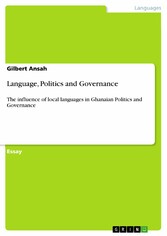Language, Politics and Governance - The influence of local languages in Ghanaian Politics and Governance
von: Gilbert Ansah
GRIN Verlag , 2019
ISBN: 9783668926097
, 7 Seiten
Format: PDF
Kopierschutz: frei
Preis: 5,99 EUR
eBook anfordern 
Mehr zum Inhalt

Language, Politics and Governance - The influence of local languages in Ghanaian Politics and Governance
Essay from the year 2017 in the subject Speech Science / Linguistics, grade: 82.50, Kwame Nkrumah University of Science and Technology, language: English, abstract: This Essay analyzes the influence of major ethnic languages in the Ghanaian phase of politics and Governance. It employs a detailed qualitative research approach to explain how local languages in Ghana cannot be sidelined in political activities as well as governance. Language is a very vital tool in human existence. Serving as the basis of communication, it is undoubtedly needed for every human act and according to Lal and Suri, language is man's finest asset. This then implies that there cannot be human existence without language, the basis of communication. Just as many countries across the globe are multilingual, Ghana is too. With about 100 ethnolinguistic groups, all further divided into numerous cultural and linguistic units, the major languages include Akan, Ewe, Dagbani, Ga and Nzema. All these languages, together with all others that have not been mentioned tend to define who Ghanaians really are. As such, the nature of politics in the country is partly built on the use of language particularly, the local languages which include the above mentioned languages as well as the various dialects used in the country.









